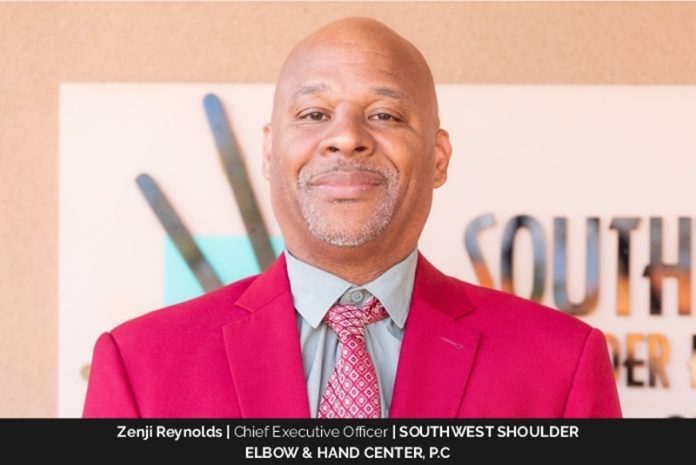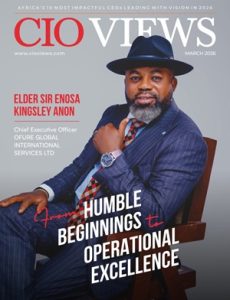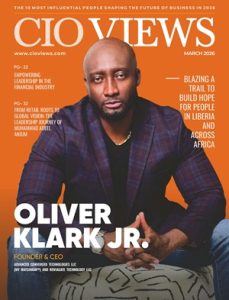Zenji Reynolds is driven by his concern for patients. As the CEO of Southwest Shoulder Elbow & Hand Center, P.C., he leads with a patient-first approach, ensuring that every decision, whether strategic growth, service expansion, or daily operations, centers around delivering the best quality care.
“Money is not my first concern,” he says. To him, success means treating patients by offering them the best possible service and ensuring positive health outcomes. “Everything we do is geared towards making sure our patients have positive outcomes,” Zenji says. He wants to take care of everyone who walks through the door — helping as many people as he can, believing everything else will take care of itself.
Zenji’s Journey into Healthcare
Zenji’s journey into healthcare has been shaped by early exposure to the field and an inherent passion for helping others.
Zenji’s mother Betty Reynolds (he also credits Regina Miller who lovingly brought him in to her family) worked in the allied health department of Columbus State, formerly known as Columbus Technical Institute. Because of his mother’s job, he was around healthcare at a very young age. His interest in healthcare was sparked by seeing his mother work and the different things she and her team were doing in allied health. Moreover, Zenji has always been a people person – he has always cared about people. While growing up, he noted that in the healthcare field, one takes care of people and makes them feel better.
When Zenji was 16, his mother talked to the people in her department, and he got admission to the phlebotomy program, which Columbus State was just starting. At the time, Zenji was still in high school. He recalls rushing from his class to attend the program at Columbus State. “It wasn’t common at that time, unlike today when many high school students earn college credits,” he says. At 16, he became a certified phlebotomist.
Through what he learned in phlebotomist class, and later, during his internship at Ohio State University Hospital, Zenji fell in love with all aspects of healthcare. When he was young, many people were amazed by his dedication. Some took him under their wings. “Once I got that exposure as a youth, along with going through the program at Columbus State, my desire to work in healthcare took off and exploded,” Zenji says.
Valuable Life Lessons
“Life is fragile” is one of the biggest lessons Zenji learned at a young age. When he was attending the phlebotomy program, he would make his rounds in the hospital. “While making my rounds, I would be a wide-eyed, excited boy because, for me, this was something new,” Zenji shares. He was also excited because he felt that by being part of healthcare, he was helping people – which he was actually doing.
During his rounds, Zenji met patients suffering from long-term diseases or people diagnosed with cancer. Some patients had a short time left to live. Zenji recalls he would usually talk to patients while drawing their blood. “Once you start talking to them, you develop a relationship, and then all of a sudden, this person that you’ve been talking to for a month or two months, they’re not there anymore,” he says. This exposure to death made him learn an important life lesson, “life is precious.” Zenji, therefore, believes in grabbing every opportunity he is offered.
Zenji remembers meeting a 12-year-old cancer patient who did not make it to 15. He says that when one is young, one thinks they are invincible. But when one sees somebody younger than oneself battling cancer, talks to them one day, and then finds them gone the next, they gain a different perspective on everything they do. This also fueled Zenji’s passion for doing his best for every patient, client, and stakeholder he encounters. “We don’t make decisions based solely on finances,” he says. We make decisions with patients’ best interest in mind.”
A New Beginning at Southwest Shoulder Elbow & Hand Center
The physicians and staff of Southwest Shoulder Elbow & Hand Center specialize in the treatment of all problems of the upper extremity, including traumatic, arthritic, congenital, sports-related, and repetitive conditions. Zenji joined the center in August 2023. “I came from a corporate, for-profit hospital,” he says. He recalls finding the first meeting with the board directors refreshing. He had met seven of them – after a few retired, the board has been streamlined to four, all from that original group — and discovered that their thinking aligned. Like him, the group also was not focused only on money — they, too, put patients first, second, and third.
After meeting the board of directors, Zenji later met the staff, whom he found “absolutely fantastic.” He realized that the center was not a place where people were simply looking for their next jobs. Many had been working there for years, some for more than two decades, Zenji says. He noted that they were there because they loved the organization and the people working for it. This also attracted him to the Southwest Shoulder Elbow & Hand Center.
The other thing that drew Zenji to the center was the freedom to make a move. He explains that in large organizations, pivoting or changing direction is often difficult, even when one has a great idea or when it becomes necessary in the future. This is due to the many factors involved. At Southwest, it is not the case. “We’ve made it easy to pivot, change directions, and make moves,” Zenji says. It is because of the structure.
As CEO, he reports to the board of directors, with whom he shares a great rapport. They trust him, and he trusts them. Southwest also has a great team environment and a family atmosphere, says Zenji.
Significant Achievement: Expanding Service Line
After arriving at Southwest Shoulder, Elbow & Hand Center, the first thing Zenji did was focus on expanding its service lines and driving growth. About ten months ago, he expanded the center to include physical therapy by launching Southwest Shoulder to Hand Therapy. “We now have a physical therapy office,” he says. He points out that it takes more than a year for a service line to become profitable after its launch. Under his leadership, Southwest’s new service line became profitable within nine months. Because of this, he is now about to sign a lease to open their second physical therapy office.
Zenji believes in speed. He says that everything they do and operate is done with the speed and efficiency that patient safety allows. He shares that someone once said, “You guys move fast.” To which he responded, “We move at the speed of patient safety and efficiency. These are the two things we prioritize. And if patient safety and efficiency are taken care of, it allows us to make moves.”
In addition to planning the opening of the second physical therapy office, Zenji is exploring different service lines. “The goal is to get our second physical therapy site up and running, and then go from there,” he says. “The expansion ideas are limitless.”
A CEO’s Responsibilities
Zenji has a set of philosophies that define his day at work. “Patients” is his first thought when he gets up in the morning. To make sure that they are taken care of, Zenji makes sure that everything is set for the day. He also ensures that his physicians and other staff members, including those on the front desk, billers, coders, medical records, ma’s, scheduler, and others, are happy and have everything they need to be successful.
“The best way I can make sure that my patients are taken care of is to make sure that my team, from top to bottom, has everything that they need to be successful,” Zenji says.
Once he ensures that, Zenji shifts his focus to what is happening in the world today. He does this because he believes that, as CEO, it is his responsibility to look at the future, plan for the future, and make projections. According to him, if he is just focused on what is happening today, then he would end up missing what is going to happen a year from now or after. He would also miss putting a plan together for where they should be headed.
Zenji points out that he cannot afford to fall behind the curve. He has to stay ahead of the curve in healthcare. To do so, he keeps himself updated about the upcoming changes in healthcare the insurance industry, and advancements in technology. This enables him to pivot quickly if the healthcare industry begins moving in a different direction. At Southwest Shoulder Elbow & Hand Center, Zenji has the freedom to pivot or maneuver in a different direction. He says, “When required, I have to shift the way I run my business to ensure its success.”
Another key responsibility for Zenji is ensuring the center’s financial health. He explains that while money is not the driving force, they still need to generate enough revenue to pay staff and doctors and ensure everyone is well taken care of. This way, the only concern they have is providing the best care for their patients.
Plans for the Future
Zenji points out that they intend to continue their expansion and growth. Southwest Shoulder Elbow & Hand Center has a team of “absolutely fantastic” physicians. They have earned patient loyalty, and some of the patients have been visiting them for 20 to 25 years. “These patients don’t want to go anywhere else,” Zenji says, Dr. Beer, Dr. Chafik, Dr. Bourne and Dr. Jain are amazing “So, we want to continue to expand, to provide great service to all stakeholders in the community.”
The plan to expand is not limited to Tucson. Zenji and his team aim to identify locations where they can grow. According to him, the key factors in choosing a location are safety, efficiency, and physicians who share their passion for patient care. “Expansion is definitely in the future,” he says. “And not just expansion for Southwest Shoulder Elbow & Hand Center, but also in other areas.”
Zenji points out that one of the reasons they opened a physical therapy center was that they found a great team of physical therapists. Before expanding to a second site, they want to make sure they can bring on board exceptional therapists. According to Zenji, their views should align with their vision. They should also understand their mission and be dedicated to helping patients and stakeholders.
Two Important People: a Brother and Mentor
Zenji and Derrick Rodgers may have different last names, but Derek is his brother and an important part of his success story. He had a successful career in the NFL, playing in the National Football League for eight years. Zenji calls him the biggest supporter in his life. “Whenever I do anything and I look to my right, he has always been there,” he adds “Derrick is more proud of me and my accomplishments than I am.” For example, when Zenji became the CEO, he was even more proud of him than he was.
Zenji shares that recently, he and his brother were at a function where someone was talking about his accomplishments: “Wow, you’re a CEO, you’ve done this and that.” Zenji looked at Derrick and noticed he had the biggest smile on his face. “There was nothing but pride in his expression,” he says. “I looked at him and thought, ‘Man, I am where I am because of you. You pushed me.’.” Zenji is also proud of his brother’s achievements and has always been there for him.
Another key person in Zenji’s journey is David Wagner, the CEO of a company he previously worked for. He was a great mentor to Zenji and the one who gave him his first opportunity as a hospital administrator. He was also the one who encouraged him to go back to school and get his master’s degree. Zenji then had a bachelor’s degree.
“Once I obtained my master’s degree, new doors opened for me,” Zenji says. “He saw something in me — I don’t know what, but he did.” To this day, they still meet for breakfast once a week. “That relationship has lasted, and I am grateful for his support,” Zenji says.
Today, Zenji still considers David one of his best friends.
Great Accomplishment: Mentoring Others
Zenji has learned from his mentors the value of mentorship. So now, he himself mentors many. For him, his greatest accomplishment is the number of people he has mentored who have gone on to become directors and hospital administrators. He shares that one of them was just promoted to a COO position, and another, who worked under him, was promoted to CEO a year ago. Zenji shares that he made his very first phone call to him.
Another Proud accomplishment for Zenji is the work he does as the Polemarch of the Phoenix Alumni Chapter of Kappa Alpha Psi Fraternity Inc. Through the fraternity Zenji is able to give back and live up to their motto of “ACHEIVEMENT in every field of human endeavor.”
As a leader, Zenji does a lot of volunteer work as well. He believes that if one is fortunate enough to provide for oneself and one’s family, giving back is an absolute must.
Message to Aspiring Leaders
“Don’t forget people” is Zenji’s advice to aspiring leaders. He says that every field revolves around people and relationships, not money. “Everything you do must be to help people,” he adds. “If you’re doing that, then you will go out and do the best job you possibly can, everything else will take care of itself.”





